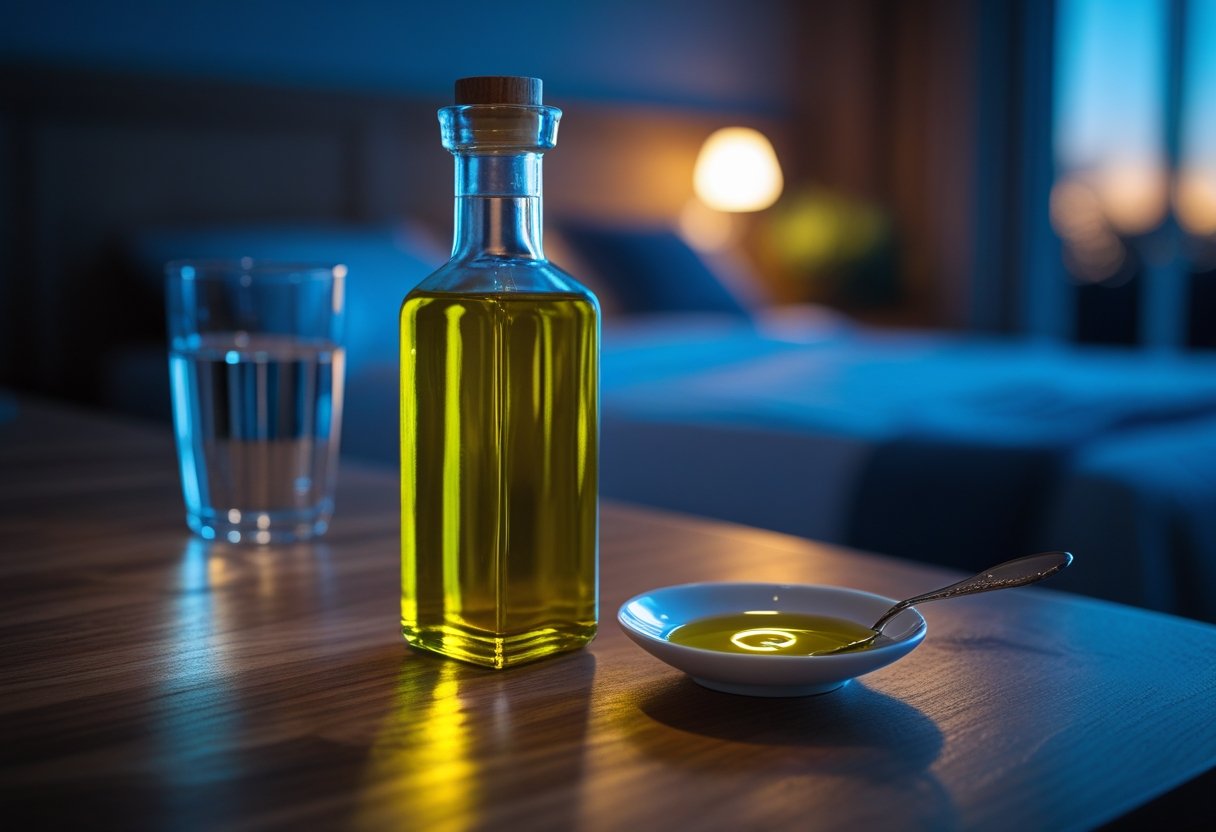Many people are discovering that drinking a small amount of olive oil before bed can affect their body in surprising ways. This simple practice has gained attention from health experts who study how different foods work in our bodies during sleep.

Taking olive oil before bedtime triggers several positive changes in the body, from better sleep quality to improved heart health. The oil’s natural compounds work throughout the night while the body rests and repairs itself. These effects happen because olive oil contains healthy fats, antioxidants, and other nutrients that support different body functions during the overnight hours.
1. Improved cardiovascular health due to antioxidants and healthy fats

Drinking olive oil before bed provides the body with heart-protective compounds. The oil contains antioxidants that help shield blood vessels from damage.
These antioxidants work to reduce harmful processes in the cardiovascular system. They fight against oxidation and inflammation that can hurt the heart over time.
Olive oil is rich in heart-healthy antioxidants and healthy fats. The monounsaturated fats in olive oil support proper heart function.
Regular consumption may help lower blood pressure levels. This reduction occurs because the healthy fats improve blood vessel flexibility and function.
The antioxidants in olive oil also work to protect the inner walls of arteries. This protection helps prevent the buildup of harmful substances that can block blood flow.
Drinking olive oil before bed gives the body time to absorb these beneficial compounds. The overnight period allows the antioxidants to work throughout the cardiovascular system.
The healthy fats help reduce bad cholesterol levels in the blood. Lower cholesterol means less risk of heart disease and other cardiovascular problems.
These heart-healthy foods work by lowering blood pressure, reducing cholesterol levels, improving the health and function of blood vessels. The process happens gradually as the body uses the nutrients from the olive oil.
People who consume olive oil regularly may see improvements in their heart health markers. Blood tests often show better cholesterol ratios and reduced inflammation levels.
2. Enhanced deep and restful sleep through natural relaxation

Olive oil contains compounds that help the body relax naturally before sleep. These healthy fats support the production of sleep-promoting hormones.
The monounsaturated fats in olive oil help regulate cortisol levels. Lower cortisol at night allows the body to prepare for rest more easily.
Olive oil also contains small amounts of tryptophan. This amino acid helps produce serotonin, which the body converts to melatonin for better sleep.
Your core body temperature naturally drops to signal sleep time. The healthy fats in olive oil support this natural cooling process.
Regular consumption before bed may help establish a calming bedtime routine. Consistent routines signal the nervous system that it’s time to wind down.
The anti-inflammatory properties of olive oil may reduce physical discomfort that disrupts sleep. Less inflammation means fewer interruptions during the night.
Some people find that the mild, soothing taste of olive oil creates a sense of comfort. This psychological effect can contribute to relaxation before bedtime.
The vitamin E in olive oil acts as an antioxidant. This may help protect cells from stress that could interfere with natural sleep cycles.
Taking olive oil consistently at the same time each night helps regulate circadian rhythms. These internal clocks control when the body feels sleepy or alert.
The slow digestion of healthy fats provides steady energy release. This prevents blood sugar spikes that might cause nighttime waking.
3. Stabilization of blood sugar levels overnight

Olive oil contains healthy monounsaturated fats that slow down digestion. This helps prevent rapid spikes in blood glucose levels during the night.
The body naturally regulates blood sugar even during sleep. Stable overnight blood sugar supports restorative rest and affects how the body functions the next day.
When someone drinks olive oil before bed, it creates a steady release of energy. The fats help maintain glucose levels without dramatic ups and downs.
Blood sugar fluctuations at night can disrupt sleep patterns. They may cause a person to wake up feeling tired or restless.
The monounsaturated fats in olive oil help slow the absorption of any remaining food in the digestive system. This creates a more gradual impact on blood glucose.
For people with diabetes or prediabetes, maintaining steady blood sugar overnight is especially important. Fluctuations in blood sugar can lead to uncomfortable symptoms and long-term health issues.
Olive oil does not contain carbohydrates that would cause blood sugar spikes. Instead, it provides healthy fats that support metabolic stability.
The body uses these fats as a slow-burning fuel source throughout the night. This helps prevent the blood sugar dips that can occur during extended periods without food.
Blood sugar and sleep are closely connected, with each influencing the other. Stable glucose levels promote better sleep quality and more consistent energy levels upon waking.
4. Support for weight management by promoting fullness
Drinking olive oil before bed can help with weight management by making you feel full. The healthy fats in olive oil send signals to your brain that you have eaten enough food.
Olive oil contains monounsaturated fats that slow down digestion. This slower process helps you feel satisfied for longer periods. Your stomach empties more gradually when you consume healthy fats.
The fat content in olive oil triggers the release of hormones that control hunger. These hormones tell your brain when you have had enough to eat. This natural process can reduce late-night cravings.
When you feel full before sleep, you are less likely to wake up hungry during the night. This can prevent midnight snacking that often leads to weight gain. Strategic eating habits help you feel fuller for longer.
Olive oil provides about 120 calories per tablespoon. While this adds calories to your daily intake, the satiety effects may help you eat less overall. The most effective way to use olive oil for weight management is to replace unhealthy fats rather than add extra calories.
The feeling of fullness from olive oil can last several hours. This extended satiety helps regulate your appetite the next morning. You may find yourself eating smaller portions at breakfast when you consume olive oil before bed.
5. Reduction in inflammation throughout the body

Olive oil contains compounds that naturally fight inflammation in the body. The main anti-inflammatory component is oleocanthal, which works similarly to ibuprofen but in much smaller amounts.
When consumed before bed, olive oil can help reduce chronic inflammation that builds up during the day. Chronic inflammation happens when your body sends out inflammatory immune cells for weeks, months, or years.
The monounsaturated fats in olive oil help calm inflammatory responses throughout the body. These healthy fats can reduce markers of inflammation in the blood.
Regular consumption may help lower inflammation in joints, muscles, and organs. This can lead to less pain and stiffness in the morning.
The antioxidants in olive oil also play a role in fighting inflammation. These compounds protect cells from damage that can trigger inflammatory responses.
Drinking olive oil before sleep gives the body time to process these anti-inflammatory compounds overnight. The digestive system can absorb the beneficial fats while the body rests.
Extra virgin olive oil provides the strongest anti-inflammatory effects. It contains higher levels of oleocanthal and other protective compounds compared to refined olive oil.
People who consume olive oil regularly often experience less overall inflammation. This can help reduce the risk of chronic diseases linked to inflammation.
The anti-inflammatory effects work best when olive oil is part of a healthy diet. Combining it with other anti-inflammatory foods can boost the benefits.
6. Slower digestion leading to prolonged satiety
Drinking olive oil before bed slows down the digestive process. The high fat content takes more energy and time for the body to break down compared to other nutrients.
This slower digestion creates a feeling of fullness that lasts longer. The stomach empties more gradually when processing fats like olive oil.
Fat digestion triggers the release of hormones that signal satiety to the brain. These hormones include CCK and GLP-1, which help regulate appetite and food intake.
The delayed gastric emptying means food stays in the stomach longer. This extended presence helps maintain the sensation of being satisfied throughout the night.
Unlike carbohydrates that digest quickly, fats provide sustained satiety signals. This can help prevent late-night hunger or early morning cravings.
The viscous nature of olive oil also contributes to slower stomach emptying. Gastroparesis affects how the stomach empties, and while olive oil doesn’t cause this condition, it naturally slows the process.
Some people may experience feeling full sooner than usual when consuming fats before bed. This is a normal response to the digestive demands of processing oil.
The prolonged satiety can be beneficial for those trying to avoid nighttime snacking. However, the slower digestion may cause discomfort in sensitive individuals.
The timing of olive oil consumption affects how long these satiety effects last. Taking it right before bed maximizes the overnight appetite-suppressing benefits.
7. Boosted immune system function from polyphenols

Olive oil contains high levels of polyphenols, which are plant compounds with antioxidant benefits. These compounds help strengthen the body’s natural defense system.
Polyphenols are chemical compounds with antioxidant and anti-inflammatory properties that support immune function. When someone drinks olive oil before bed, these compounds enter their system and begin working overnight.
The polyphenols in olive oil help reduce inflammation throughout the body. This reduction allows the immune system to work more effectively against harmful bacteria and viruses.
Through regulation of the immune system, polyphenols could beneficially impact chronic diseases. The body uses this time during sleep to repair and strengthen immune responses.
Extra virgin olive oil contains the highest concentration of these beneficial compounds. The polyphenols remain active in the body for several hours after consumption.
Regular intake of polyphenol-rich olive oil may help the body fight off infections more quickly. The antioxidant properties protect immune cells from damage caused by free radicals.
Sleep provides the perfect opportunity for these compounds to work. The body’s natural repair processes combine with polyphenols to enhance overall immune function.
Polyphenols are natural enhancers of the immune system that support long-term health. Taking olive oil before bed maximizes the time these compounds have to benefit the immune system.
8. Improved skin hydration and elasticity

Drinking olive oil before bed provides essential fatty acids that support skin health from within. These healthy fats help maintain the skin’s natural barrier function.
The monounsaturated fats in olive oil can enhance cellular hydration. This internal moisture support works alongside topical skincare products.
Proper hydration is crucial for maintaining structural support and elasticity in the skin. Olive oil consumption contributes to this hydration process through its fat content.
Skin elasticity refers to the ability of skin to stretch and return to its original shape. Well-hydrated skin typically maintains better elasticity than dehydrated skin.
The vitamin E in olive oil acts as an antioxidant that may help protect skin cells from damage. This protection can support the skin’s natural repair processes during sleep.
While drinking water is essential for overall health and can improve skin hydration, it should not be viewed as a magic solution for skin elasticity. A balanced approach including healthy fats like olive oil provides additional benefits.
The nighttime consumption allows the body to process these nutrients during natural repair cycles. Sleep is when many cellular renewal processes occur.
Regular olive oil intake may contribute to a more supple skin texture over time. The combination of internal hydration and antioxidant protection supports overall skin function.
This benefit works best when combined with adequate water intake and proper skincare habits. External moisturizing remains important for optimal skin health.
9. Enhanced brain health via omega-9 fatty acids

Olive oil contains high levels of omega-9 fatty acids, particularly oleic acid. These monounsaturated fats play an important role in supporting brain function and cognitive health.
Omega-9 fatty acids can boost energy levels and enhance mood when consumed regularly. The oleic acid in olive oil helps reduce erratic mood swings and promotes more stable energy throughout the day.
Unlike omega-3 and omega-6 fatty acids, the body can produce omega-9 on its own. However, getting additional amounts from dietary sources like olive oil provides extra support for brain health.
Foods rich in omega-9, such as olive oil, can indirectly support brain health when included as part of a balanced diet. These healthy fats help maintain proper brain cell structure and function.
The omega-9 fatty acids in olive oil may help protect brain cells from damage. They support the production of healthy cell membranes in the brain, which is essential for proper communication between neurons.
Regular consumption of olive oil before bed allows the body to absorb these beneficial fatty acids during sleep. This timing may help optimize the brain’s natural repair and maintenance processes that occur overnight.
Omega-9 fatty acids work alongside omega-3 and omega-6 to maintain overall brain health. Each type of fatty acid contributes different benefits to cognitive function and brain development.
10. Lowered risk of metabolic syndrome

Metabolic syndrome is a cluster of conditions that increase the risk of heart disease, stroke, and type 2 diabetes. These conditions include high blood pressure, elevated blood sugar, excess belly fat, and abnormal cholesterol levels.
Olive oil contains compounds that may help address several risk factors associated with metabolic syndrome. The monounsaturated fats in olive oil can support healthy cholesterol levels when consumed as part of a balanced diet.
Regular olive oil consumption may help improve insulin sensitivity. This can be important since insulin resistance is one of the key components of metabolic syndrome.
The anti-inflammatory properties of olive oil may also play a role in reducing metabolic syndrome risk. Chronic inflammation contributes to many of the conditions that make up this syndrome.
Obesity and an inactive lifestyle add to risk factors for metabolic syndrome. While olive oil alone cannot prevent weight gain, its healthy fats may help people feel more satisfied after meals.
The polyphenols in extra virgin olive oil provide additional benefits. These compounds have been studied for their potential effects on blood sugar control and cardiovascular health.
Drinking olive oil before bed allows the body to process these beneficial compounds during overnight recovery. This timing may optimize how the body uses these nutrients for metabolic processes.
Following a healthy diet can help reduce risk of metabolic syndrome. Including olive oil as part of an overall healthy eating pattern may contribute to better metabolic health outcomes.
How Olive Oil Interacts With the Body Overnight

When consumed before bed, olive oil undergoes specific digestive processes that continue through the night. The body’s metabolism slows during sleep, which affects how fats are processed and stored.
Absorption and Digestion Process
The digestive system handles olive oil differently at night compared to daytime consumption. Fat digestion typically takes 6-8 hours to complete.
Olive oil moves from the stomach to the small intestine within 30-60 minutes after consumption. The pancreas releases lipase enzymes to break down the fat molecules.
Key absorption stages include:
- Stomach processing: 30-90 minutes
- Small intestine breakdown: 2-4 hours
- Liver processing: 4-6 hours
- Complete absorption: 6-8 hours
The body absorbs about 95% of consumed olive oil. This high absorption rate means most nutrients enter the bloodstream during sleep hours.
Monounsaturated fats in olive oil require less energy to digest than saturated fats. This easier digestion process may contribute to better sleep quality during the night.
Impact on Metabolism While Sleeping
Sleep naturally slows metabolic rate by 10-15% compared to waking hours. Olive oil consumption adds calories that the body must process during this slower metabolic state.
The liver works actively during sleep to process fats from olive oil. It converts some fatty acids into ketones for energy storage.
Nighttime metabolic effects:
- Fat storage increases when metabolism is slower
- Liver fat processing continues for 6-8 hours
- Blood sugar levels may stabilize overnight
- Hormone production can be affected
Taking 1-2 teaspoons before bed provides about 40-80 calories. The body typically stores excess nighttime calories as fat rather than burning them for immediate energy.
The timing matters because the body’s natural fat-burning processes are reduced during sleep compared to daytime activity.
Factors That Influence Olive Oil’s Effects at Bedtime

The quality of olive oil and personal health factors play major roles in determining how effective this bedtime practice will be. These variables can change how well the body absorbs nutrients and experiences potential benefits.
Type and Quality of Olive Oil
Extra-virgin olive oil provides maximum polyphenol content compared to other types. This matters because polyphenols are the compounds that give olive oil many of its health benefits.
Regular olive oil goes through more processing. This removes many beneficial compounds that could help with sleep and digestion.
Cold-pressed olive oil keeps more nutrients intact. The pressing method affects how many antioxidants remain in the final product.
Key differences between olive oil types:
- Extra-virgin: Highest nutrient content, most beneficial compounds
- Virgin: Moderate nutrient levels, some processing
- Regular: Heavily processed, fewer beneficial compounds
- Light: Most processed, lowest nutrient content
The harvest date also matters. Fresher olive oil contains higher levels of active compounds. Oil that sits on shelves for months loses potency over time.
Storage conditions affect quality too. Heat, light, and air exposure break down beneficial compounds. Dark bottles and cool storage help preserve nutrients.
Individual Differences and Health Conditions
Body weight affects how olive oil impacts each person. Smaller individuals may feel effects more strongly from the same amount compared to larger people.
Digestive health plays a big role. People with sensitive stomachs might experience discomfort from drinking olive oil on an empty stomach. Those with gallbladder issues should check with doctors first.
Factors that change olive oil’s effects:
- Age and metabolism speed
- Current diet and eating habits
- Medication interactions
- Sleep disorders or conditions
- Existing heart or digestive problems
Some people absorb fats better than others. Genetic differences affect how the body processes monounsaturated fats from olive oil.
Current medications can interact with olive oil. Blood thinners and diabetes medications may be affected by regular olive oil consumption.
People with acid reflux might find olive oil makes symptoms worse at bedtime. The timing and amount become more important for these individuals.
Sleep patterns already established influence results. Those with existing good sleep habits may notice fewer changes than people with sleep problems.
Frequently Asked Questions

People often wonder about the timing, safety, and specific benefits of consuming olive oil before sleep. These common questions address the most important aspects of nighttime olive oil consumption and its effects on various body systems.
What are the health benefits of consuming olive oil at bedtime?
Drinking olive oil before bed provides several key health benefits due to its rich nutrient profile. The antioxidants and monounsaturated fats in olive oil work overnight to support cardiovascular health and reduce inflammation.
Regular olive oil consumption may help stabilize blood sugar levels during sleep hours. This stabilization can improve overall metabolic function and energy levels.
The oleic acid found in olive oil acts as a natural relaxation agent. This compound can promote deeper, more restful sleep patterns when consumed before bedtime.
Can drinking olive oil before sleep improve digestive health?
Olive oil can support digestive health when consumed at night. The healthy fats help lubricate the digestive tract and may ease constipation.
Taking olive oil before bed allows the digestive system time to process the nutrients slowly. This gradual absorption can reduce digestive stress and improve nutrient uptake.
Some people find that olive oil helps reduce acid reflux symptoms. The oil may coat the stomach lining and provide a protective barrier against acid.
Does olive oil intake before bed aid in weight management?
Olive oil before bed can support weight management through several mechanisms. The healthy fats promote feelings of fullness that can last through the night and into the morning.
The monounsaturated fats in olive oil may help with weight loss efforts when consumed as part of a balanced diet. These fats can help regulate hunger hormones and reduce late-night cravings.
Consuming olive oil at bedtime may boost metabolism during sleep. The body uses energy to process the healthy fats, which can contribute to overnight calorie burning.
Are there any skin benefits associated with nightly olive oil consumption?
Regular olive oil consumption can improve skin health from the inside out. The vitamin E and antioxidants in olive oil help protect skin cells from damage and support repair processes.
The anti-inflammatory properties of olive oil may reduce skin redness and irritation. These effects become more pronounced with consistent nightly consumption over time.
Olive oil helps maintain skin moisture by supporting the body’s natural oil production. This internal hydration can lead to softer, more supple skin texture.
Is it safe to have olive oil on an empty stomach at night?
Most people can safely consume olive oil on an empty stomach at night. The recommended amount is 1-2 teaspoons to avoid consuming too many calories.
People with sensitive stomachs may experience mild nausea when taking olive oil without food. Starting with smaller amounts can help determine individual tolerance levels.
Those with gallbladder issues should consult a doctor before consuming olive oil on an empty stomach. The oil can stimulate bile production, which may cause discomfort in some individuals.
How does olive oil before bedtime affect heart health?
Olive oil consumption before bed supports cardiovascular health through its high content of monounsaturated fats. These healthy fats can help reduce bad cholesterol levels and support good cholesterol.
Studies show that olive oil has positive effects on heart health when consumed regularly as part of a balanced diet. The antioxidants in olive oil help protect blood vessels from damage.
Taking olive oil at night allows the body time to process these heart-healthy compounds during sleep. This timing may maximize the cardiovascular benefits of regular olive oil consumption.